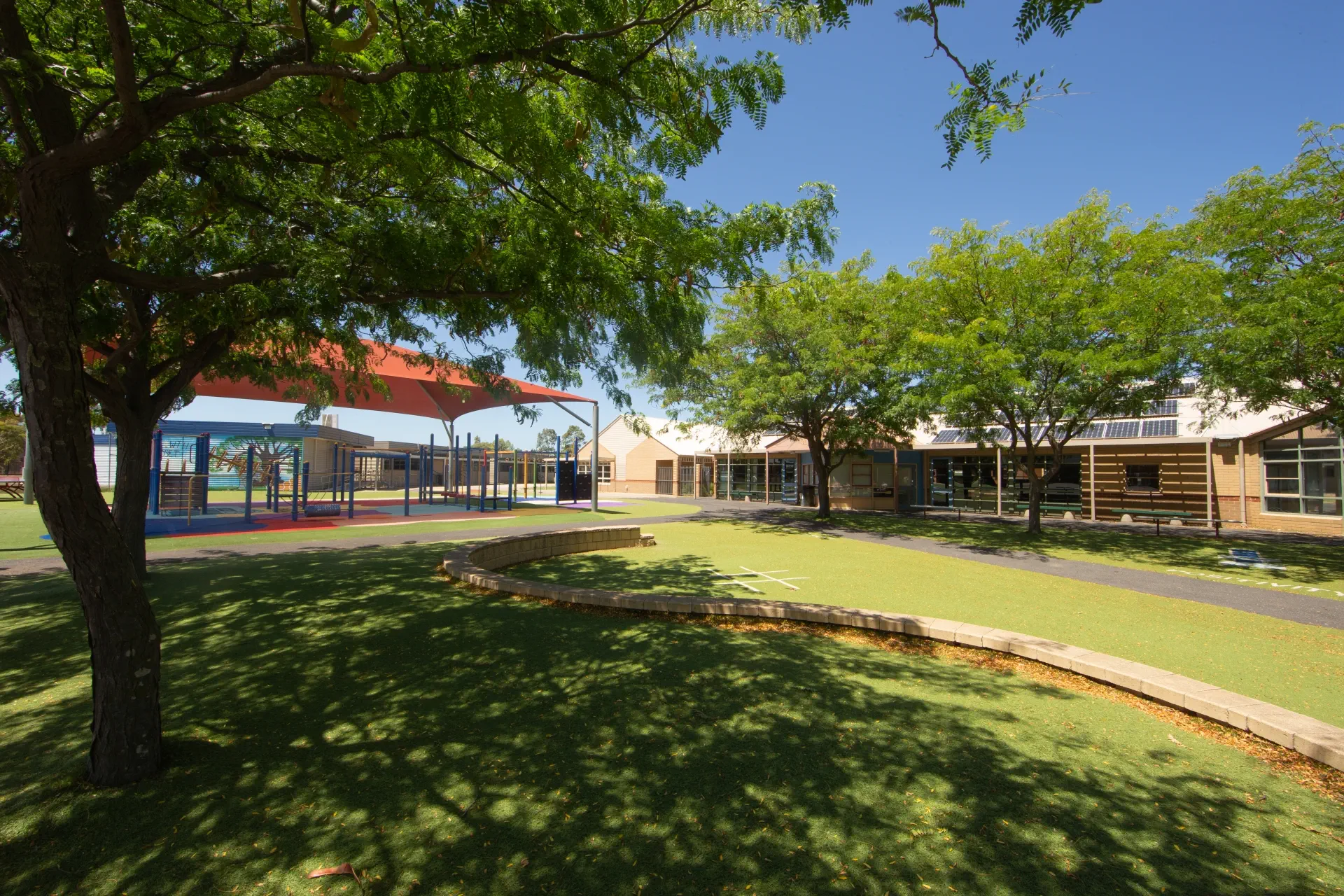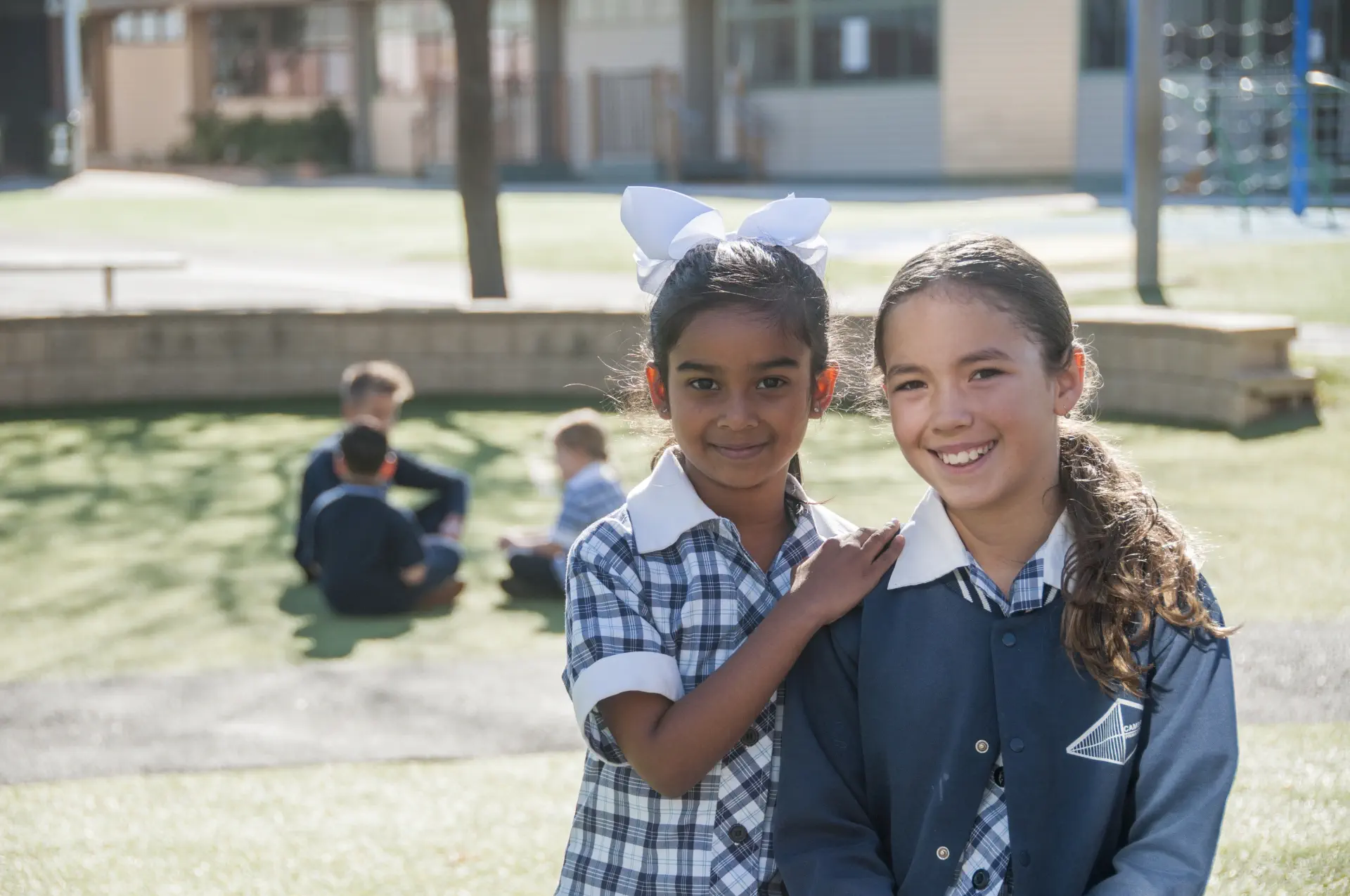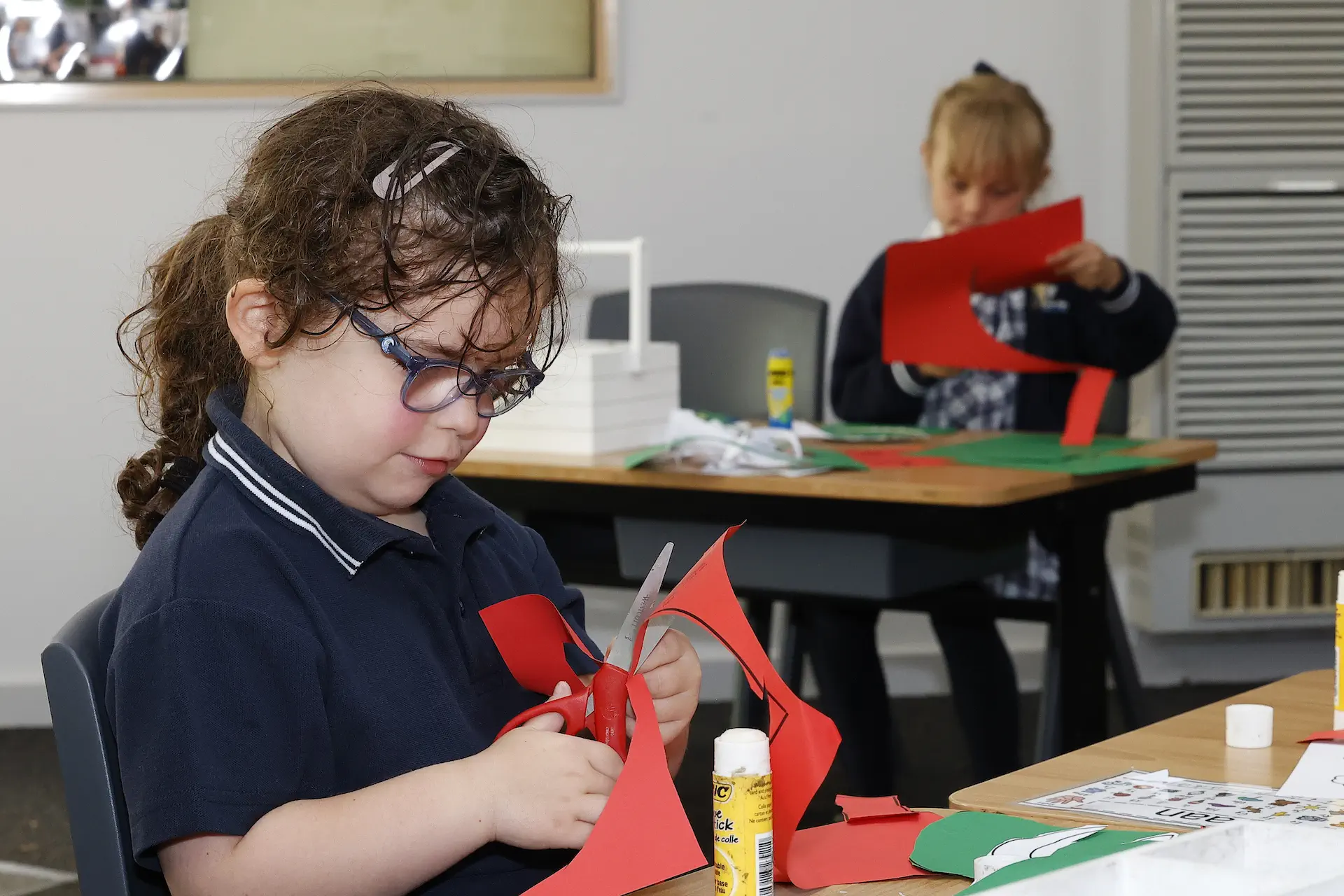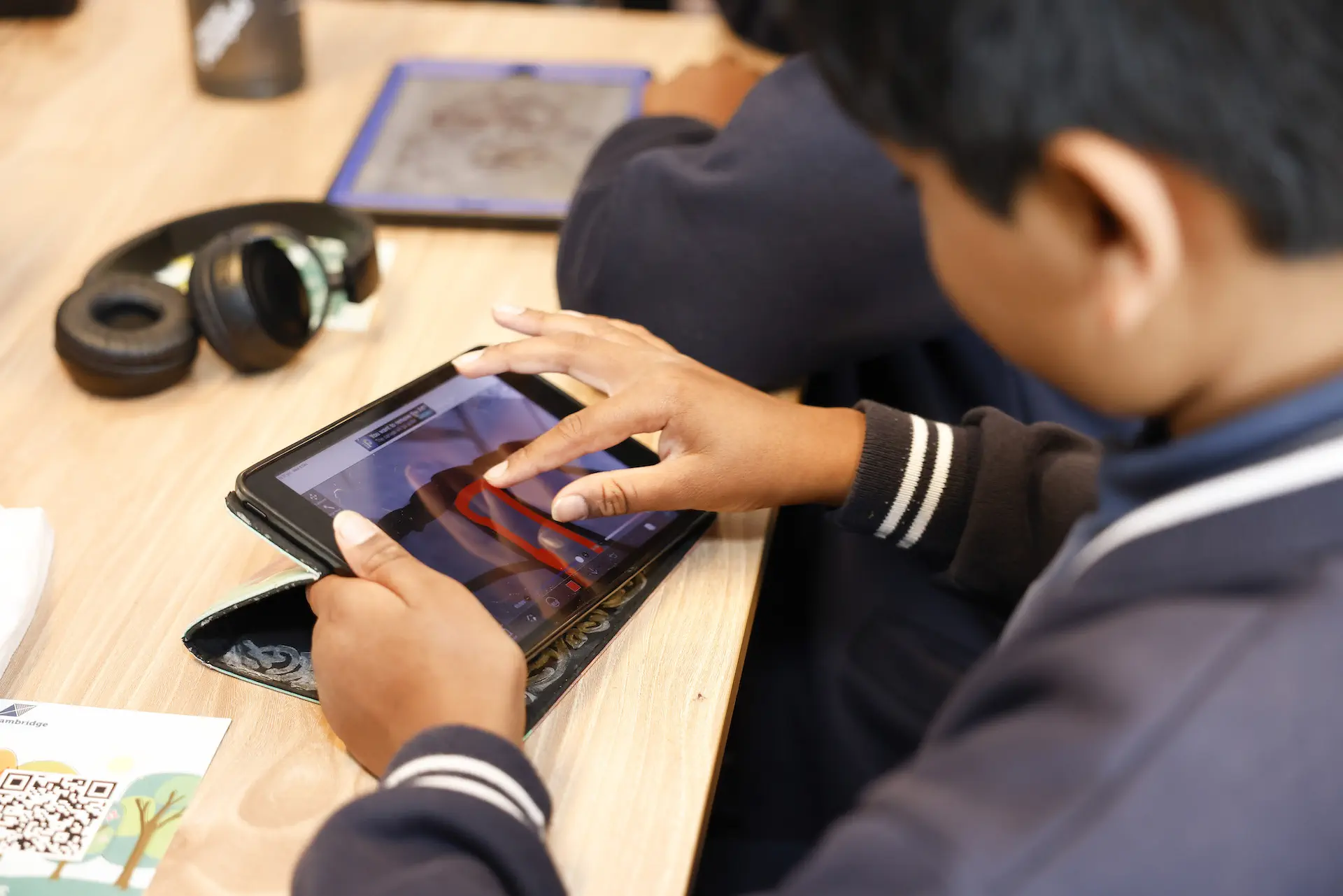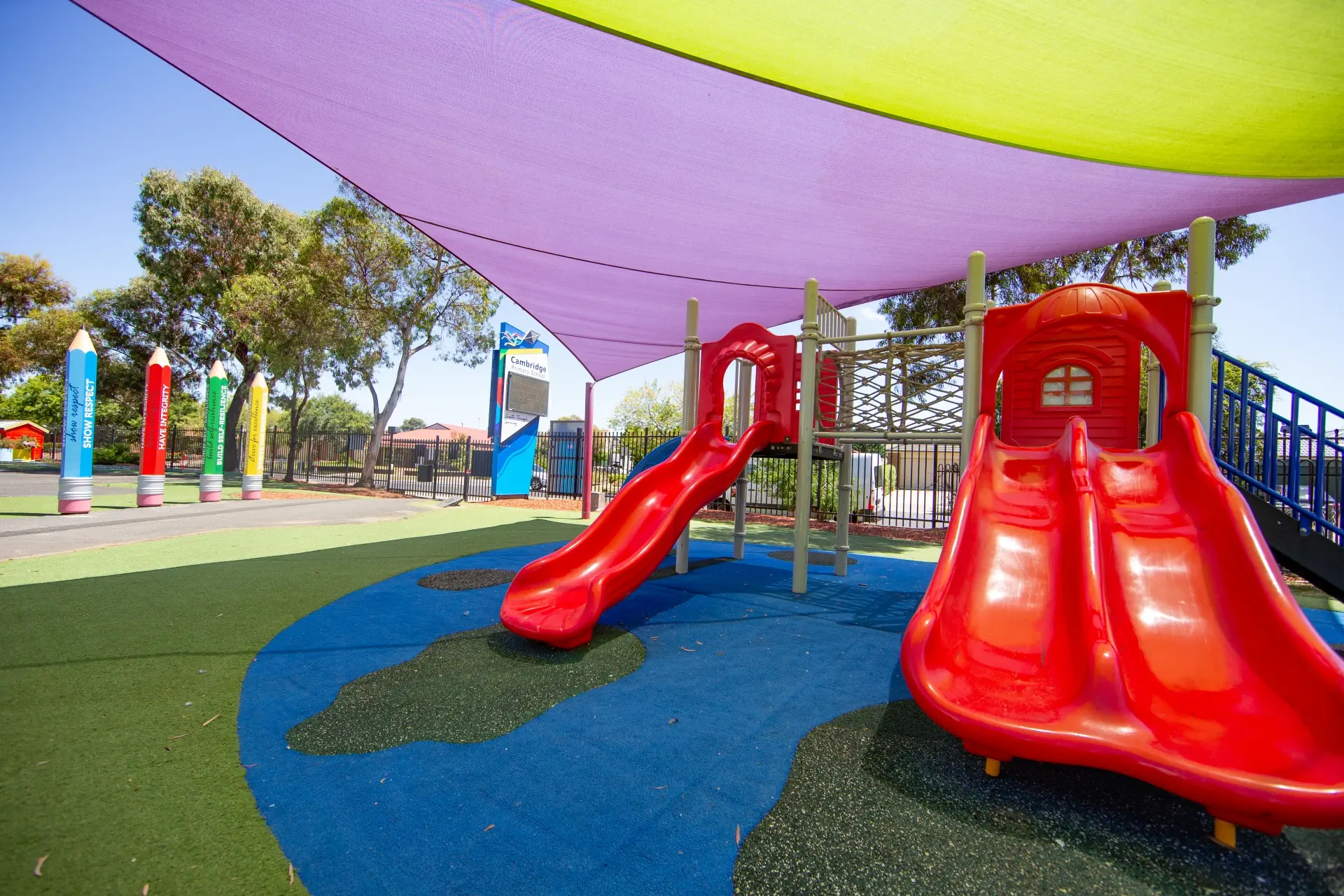School Profile
OUR VISION
Growth Through Learning
OUR MISSION STATEMENT
At Cambridge Primary School, our mission is to nurture lifelong learners who actively contribute to cultivating a positive, inclusive, and thriving school and community environment.
From the Principal
Allow me to extend a warm welcome to each one of you. It is such an honour and privilege to be the Principal of Cambridge Primary School and lead such an exceptional and remarkable community. At Cambridge Primary School, our mission is to nurture lifelong learners who actively contribute to the creation of a positive, inclusive, and thriving school culture.
Our commitment at Cambridge Primary School is to the continuous improvement of every student, teacher, and school leader. We place students’ wellbeing and learning at the forefront, ensuring they have the support and resources necessary to reach their fullest potential. As Principal, I am dedicated to ensuring Cambridge Primary School remains a forward-thinking professional learning community, focused on preparing our students for success in the 21st century.
Our core values: RESPECT, INTEGRITY, SELF–RESILIENCE, EXCELLENCE – guide us in all that we do. We foster an environment where compassion, honesty, perseverance, and a pursuit of excellence are celebrated and encouraged.
Education is a life-long journey, and together, we will continue to learn and inspire – students, teachers, and parents alike – at Cambridge Primary School. Most importantly, a strong partnership between families and the school is essential for the success of our students, and I encourage you to engage with us in every way possible. I am excited about the achievements that await us as we work together to support our students and look forward to celebrating our collective successes in the years to come.
Jane Budd
Principal, Cambridge PS
Student Leadership
Cambridge PS has an active student leadership team. It consists of School Captains, House Captains and a team of Junior School Councillors who are nominated by their peers from across Years 4, 5 and 6.
Junior School Councillors work with nominated staff members to implement school improvement projects and raise awareness of various social justice projects. They develop leadership skills to become responsible role models.
Our student leadership team is led by our School Captains from Year 6. At the end of Year 5, students prepare and present a speech to their peers, Principal and Assistant Principals explaining how they plan to best represent their peers and school community. They will also explain how they will contribute to the achievement of our school’s vision, mission, values and goals.
The School Captains at Cambridge PS work collaboratively with the Principal and Assistant Principals to conduct school assemblies and also play an important role in representing the school community at events such as Enrolment Week, Prep Transition and School Council.
Cambridge PS has four Houses – Carruthers (Blue), Westmill (Yellow), Dowling (Red) and Barber (Green). House Captains are voted by their peers each year to participate in an active interview process that assesses their physical, leadership and teamwork abilities. The House Captains assist the Physical Education teachers in all aspects of the sport, health and physical education program, including setting up for interschool sports, the athletics carnival, breaktime borrowing, the mini Olympics and Footy Day.
School Strategic Plans
Annual Reports
2024 Annual Report to The School Community
2023 Annual Report to The School Community
2023 Annual Implementation Plan
2022 Annual Report to The School Community
2022 Annual Implementation Plan
2021 Annual Report to The School Community
2021 Annual Implementation Plan
2020 Annual Report to The School Community
2020 Annual Implementation Plan
Enrolments
The school zone for Cambridge PS is available on findmyschool.vic.gov.au which hosts the most up-to-date information on school zones in Victoria.
Students residing within our school zone are guaranteed a place at our school, which is determined based on your permanent residential address.
Cambridge PS manages enrolments using the Placement Policy to ensure that students have access to their designated neighbourhood school and may enrol at another school, if there are available places.
If you are interested in enrolling at Cambridge PS, please contact the school Enrolments Officer:
ATTN: Judy Shaw
E: [email protected]
T: 03 9748 9011
Once contact has been made, the school Enrolments Officer can forward all relevant enrolment forms/information to you.
For more information, you can:
- visit School zones for answers to frequently asked questions
- visit the Victorian Government ‘Starting School’ webpage, which contains information for families on how to enrol their child in a Victorian government school and outlines the timeframes for submitting Foundation (Prep) enrolment applications for the future school year
- call the Victorian School Building Authority (VSBA) on 1800 896 950
- email the VSBA at [email protected]
Designated Neighbourhood School
Cambridge PS is a Designated Neighbourhood School. Enrolment is open to families whose permanent residential address (at the time of seeking enrolment) resides within the area of the designated neighbourhood school (referred to as a ‘school zone’) boundary as shown on the map below. If your child lives at multiple addresses, their permanent residential address is the address at which they spend most of their weekdays.
To check if your permanent residential address falls within the Cambridge PS school zone:
- Visit the following website: www.findmyschool.vic.gov.au
- Type in your residential address
- Select the year the student will be enrolling
- Select the correct school type

Enrolment Process
Enrolment applications are open year round. To be eligible to enrol for Prep, children must have turned 5 years of age by April 30th in the year of enrolment/commencement at the school.
To allow for planning and preparation for the following academic year, parents/carers are asked to submit enrolment applications by the 30th September. This is especially important for parents enrolling their child into Prep, as it will allow teachers to liaise with kindergarten teachers or childcare staff.
We understand that it may not be possible to submit an enrolment application prior to the end of September and wish to reassure parents that enrolments will remain open after this date. However, children who are enrolled later in the year may miss out on attending some or all our planned transition program sessions depending on how late the application is submitted to the school.
Cambridge PS collects information as part of the enrolment process to support children when they start school. To verify this information, the school may ask for supporting documentation.
Schools must collect evidence to confirm a student’s name, date of birth, address, residency status, care arrangements and medical or health-related needs.
The below checklist details what documents parents/carers must provide when enrolling their child in a Victorian government school:
Enrolment Documentation Checklist for Parents and Carers
Parents/Carers living within the Cambridge PS school zone who wish to enrol their child may be asked to complete a 100-point residential address check. Documents should show the same parent/carer name and residential address as recorded on the enrolment form to verify your child’s permanent residential address.
100-POINT RESIDENTIAL ADDRESS DOCUMENTS
1. One of the following (40 points):
- Council rates notice OR
- Lease agreement through a registered real estate agent of rental board bond receipt OR
- Exchanged contract of sale
2. Any of the following (20 points each):
- Centrelink payment statement showing residential address
- Electoral roll statement
3. Any of the following (15 points each):
- Electricity or gas bill showing the service address*
- Water bill showing the service address*
- Telephone or internet bill showing the service address*
- Driver’s license or government issued ID showing current residential address*
- Home building or home contents insurance showing the service address
- Motor vehicle registration or compulsory third party insurance policy showing home address
* up to 3 months old
School Tours
Cambridge PS are currently opening places for 2027 Prep enrolment tours. Please use the following link to secure a place: https://forms.gle/9FFQsfE8Y7qy1Bqq5
Tours will be taking place on the dates below:
Friday, 20th February 2026 – 9:30am
Friday 6th March 2026 – 9:30am
Please note that all tours will contain the same information, so there is no requirement to attend more than one.
Transition Program
PREP
Cambridge PS holds a transition program during November and December each year for Prep students commencing at the school in the following calendar year. Parents/carers of enrolling Prep students will be invited to attend several sessions and we strongly encourage parents/carers to bring their child along to each session.
Sessions run for approximately 90 minutes, and during this time children will be able to meet the Prep teachers and other Prep students enrolling at the school, spending some time in the classroom engaging in fun activities.
Starting primary school can be a very daunting experience, and children who attend Prep transition tend to settle into school more easily.
YEAR 1-6
Students enrolling into years 1-6 in the following calendar year will be invited to attend the State-wide Transition Day, usually held in early December each year.
Curriculum
At Cambridge PS, we pride ourselves on our excellent achievements in literacy and our passion for learning. We, as teachers, work together in Professional Learning Communities to develop our knowledge and skills as leaders of literacy learning. We work in teams to plan our literacy program and then work together to assess the achievements of our students. This constant focus on the learning that is happening in our school allows us to refine our lessons and differentiate the curriculum to meet the needs of every student. Importance is placed on all staff working together to keep abreast of best practices and current research in teaching of literacy.
Our teachers understand what it takes to provide students with the necessary knowledge and skills to successfully navigate the curriculum as 21st Century learners and fully participate and contribute to an ever-changing, global community.
Literacy and numeracy are key life skills that enable students to learn and thrive in all curriculum areas. Success in these foundational areas at Cambridge PS will benefit students for the rest of their lives. To ensure our students gain the fundamental skills needed in their reading journey a research-based phonics program (MSL) is delivered for 25 minutes a day in Prep to Year 2 classrooms.
The Victorian Curriculum 2.0 ensures that students are better equipped to deal with our changing world. The curriculum includes a strong focus on the foundational skills of literacy and numeracy, personal and social skills and new areas of learning.
L.O.T.E
At Cambridge PS, our LOTE program helps students to develop an understanding of the Italian language and culture.
Students will practice pronouncing words and short sentences with others and will gain confidence with unfamiliar Italian words.
The students will learn to count in Italian, basic greetings, colours, animals and much more. The LOTE classroom is an engaging space with displays, posters and student work that are ever changing with the students interests and topics.
Physical & Health Education
At Cambridge PS we believe in making sure that all of our community members, and in particular our students, are active and healthy citizens. We place a strong emphasis on physical and health education and our students are exposed to this via weekly Physical Education lessons delivered by specialist teachers.
Students at Cambridge PS engage in whole school events such as our annual Cross Country, Athletics Carnival and our Mini Olympics day.
As a school we are involved with inter-school sporting events that are organised by School Sport Victoria. This involves both Winter and Summer sports such as T-Ball, Volleyball, Football, Cricket, Netball and Basketball.
Carruthers – Blue
Barber – Green
Dowling – Red
Westmill – Yellow

STEM
At Cambridge PS, our STEM (Science, Technology, Engineering and Math) program is focused on science, design technology, digital technology, and the 21st-century skills of critical and creative thinking. We also offer a STEM Extension program for selected junior (Year 1 – 3) and senior (Year 4 – 6) students. Students participate in STEM each week with each session being designed by specialist STEM teachers with industry expertise.
The Science units of study are Biological, Chemical, Physical, and Earth and Space Sciences. Students explore coding, stop motion, spreadsheets, and other digital technology platforms. Through these topic areas and activities, students develop their skills in researching, designing, constructing, investigating, and reflecting. Students are regularly involved in hands-on learning where they plan, create, experiment and problem-solve with materials to connect their new understanding and skills to the world around them.
Visual Art
Visual Art is a vital component in the development of the whole child. The Visual Art program at Cambridge PS aims to provide students with the skills, techniques and processes needed to design and create a wide variety of artworks. Students have the opportunity to build upon their skills and knowledge while being immersed in the Visual Arts of different times, countries and cultures, as well as indigenous, traditional and contemporary Australian Art. Students are encouraged to share and discuss their own work and that of their peers. Tasks are often open ended, encouraging student choice, experimentation and creative thinking.
Prep – Year 6 students participate in weekly art sessions, organised by a specialist Visual Art teacher, for one semester each year.
Extra-Curricular Programs
Excursions/Incursions
Camp Program (Year 4 and Year 6)
Cybersafety (Years 2 – 6)
Interschool Sports (Year 6)
Personal Development; Knowing and Growing (Years 5 & 6)
Respectful Relationships
School Nursing program (Wyndham City Council) (Prep)
Student Leadership (Years 4 – 6)
Special Breakfast Club events
Chess
Education and Book Week
Music Bus
1:1 BYOD Apple iPad
Beginning in 2026, students will no longer be required to bring their own iPads to school.
As part of our long-term planning, and to align with the new Department of Education guidelines coming into effect in 2027, the school is investing in school owned iPads. These devices will be shared within double classrooms to ensure all students have access to the technology they need for learning.
This approach will help us:
- ensure consistency in the digital tools’ students use and reduce the financial burden on families
- support safe, structured and purposeful use of technology in the classroom
Thank you for your ongoing support as we continue to improve our learning environment and plan for future changes.
Child Safe
Cambridge PS is committed to the safety and wellbeing of all children and young people. This will be the primary focus of our care and decision-making.
Cambridge PS strives to equip and empower life long learning that contribute collaboratively to build a positive, inclusive and successful school and community. Our four values of Respect, Integrity, Self-Resilience, and Excellence are taught explicitly within the classroom and across school settings and guide the decisions and behaviours of all members of our school community, including relation to child safety:
- Respect – show care and concern for others
- Integrity – be safe, honest, true, fair and considerate, take responsibility for your actions
- Self-resilience – bouncing back from setback and having a growth mindset
- Excellence – aiming high to be the very best we can
Cambridge PS has zero tolerance for child abuse.
We are committed to providing a child safe environment where children and young people are safe and feel safe, and their voices are heard about decisions that affect their lives. Our child safe policies, procedures, strategies and practices will be inclusive of the needs of all children, particularly Aboriginal and Torres Strait Islander children, children from culturally and linguistically diverse backgrounds, children with disabilities, students in out of home care, LGBTI students and children who are vulnerable.
Every person involved in Cambridge PS has a responsibility to understand the important and specific role they play individually and collectively to ensure that the wellbeing and safety of all children and young people is at the forefront of all they do and every decision they make.
CHILD SAFETY PRINCIPLES
In its planning, decision-making and operations, Cambridge PS will:
- Take a preventative, proactive and participatory approach to child safety
- Value and empower children to participate in decisions which affect their lives
- Foster a culture of openness that supports all persons to safely disclose risks of harm to children
- Respect diversity in cultures and child rearing practices while keeping child safety paramount
- Provide written guidance on appropriate conduct and behaviour towards children
- Engage only the most suitable people to work with children and have high quality staff and volunteer supervision and professional development
- Ensure children know who to talk with if they are worried or are feeling unsafe, and that they are comfortable and encouraged to raise such concerns
- Report suspected abuse, neglect or mistreatment promptly to the appropriate authorities
- Share information appropriately and lawfully with other organisations where the safety and wellbeing of children is at risk
- Value the input of and communicate regularly with families and carers
Government & Department of Education Links
Policies and Forms
Administration of Medication Policy
Anaphylaxis Management Policy
Asthma Policy
Attendance Policy
Camps and Excursions Policy
Camps, Sports and Excursions Fund (CSEF) Policy
Camps, Sports and Excursions Fund (CSEF) Application Form
CCTV Privacy Notice
Complaints and Concerns Policy
Curriculum Framework
Digital Technology – Acceptable Use Agreement
Duty of Care Policy
Inclusion and Diversity Policy
Parent Payments Policy
Parent Payment Arrangements 2026
Photographing, Filming and Recording Students Policy
Preventing and Addressing Racism in Schools Policy
Privacy Collection Notice
Privacy Policy
Statement of Values and School Philosophy Policy
Student Dress Code Policy
Student Exit Form
Student Wellbeing and Engagement Policy
Sun Protection Policy
